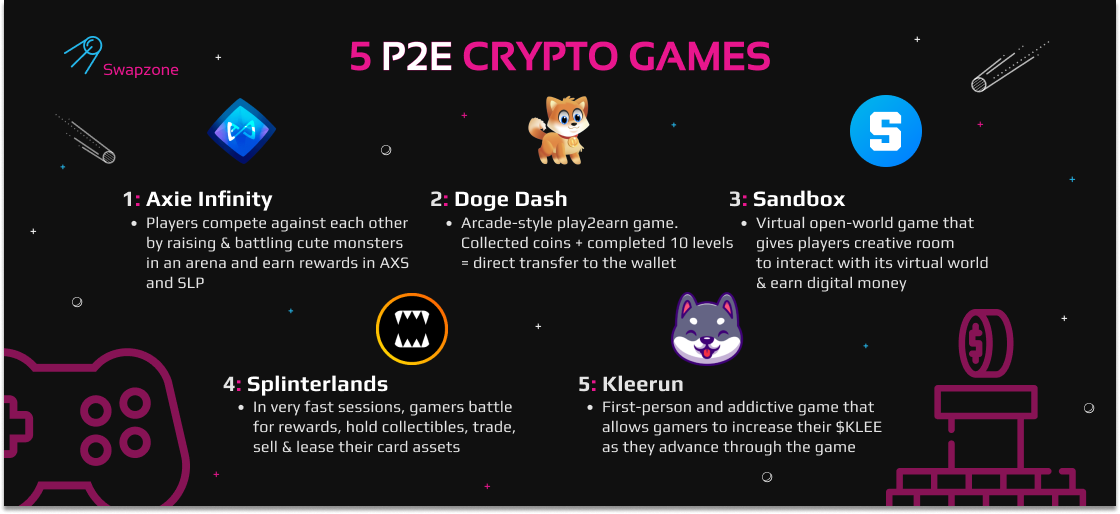How Play-to-Earn Benefits Are Transforming the Gaming Experience
The arrival of Play-to-Earn benefits notes a considerable evolution in the video gaming landscape, shifting the emphasis from mere amusement to authentic financial involvement. This makeover invites gamers to invest not just their time but additionally their monetary resources, fostering a feeling of possession and much deeper engagement within game communities. As diverse demographics embrace these opportunities, brand-new areas emerge, obscuring the lines in between leisure and financial investment. Yet, this transition increases vital questions regarding sustainability and the future of pc gaming. What ramifications could this have for the sector and its gamers?

Evolution of Video Gaming Versions
The landscape of pc gaming has undergone a substantial transformation over the decades, progressing from typical pay-to-play models to much more ingenious frameworks that prioritize individual interaction and money making. Originally, games were mainly offered as standalone products, needing ahead of time settlements for access. This model, while effective in generating revenue, typically limited player interaction and community structure.

In the last few years, the surge of blockchain modern technology has actually introduced play-to-earn systems that fundamentally alter gaming characteristics. These versions not just supply a platform for players to earn incentives yet also democratize the video gaming economy, permitting individuals to have in-game properties. This evolution shows a broader pattern in the direction of community-driven experiences, where designers and players collaborate in shaping the video gaming landscape, eventually redefining how value is perceived in the video gaming market.
Advantages of Play-to-Earn Systems
Unlocking new avenues for player involvement, play-to-earn systems use a variety of advantages that essentially improve the gaming experience. These systems equip gamers by offering concrete incentives for their effort and time, promoting a feeling of possession and investment in the video game. This inherent inspiration drives gamers to engage more deeply, checking out video game mechanics and communities that they could or else forget.
Moreover, play-to-earn models democratize pc gaming by leveling the having fun area. Players from various histories can profit from their skills and creativity, allowing brand-new entrants to experience financial benefits that were generally booked for designers and publishers. This change encourages a more diverse player base, enriching the pc gaming ecological community with diverse perspectives and experiences.
In addition, play-to-earn systems promote neighborhood building, as gamers collaborate and compete within decentralized environments. This interaction cultivates social links that improve satisfaction and retention, as players feel a sense of belonging.
Lastly, these systems can lead to increased long life for games, as regular gamer engagement frequently converts right into sustained rate of interest and investment in future iterations or expansions, making certain a vibrant pc gaming landscape.
Financial Influence On Players
Play-to-earn systems not just boost gamer involvement but likewise have considerable economic effects for people involved. These systems permit players to monetize their time and skills, changing video gaming from a pastime into a viable earnings source. As players earn copyright or in-game assets that can be traded or marketed in real-world markets, they acquire financial motivations that can considerably affect their personal economies.
The economic model promotes a new age of entrepreneurship, as gamers can buy different gaming ecosystems or develop strategies additional reading to enhance their earnings. This possibility for income generation brings in a diverse group, consisting of those in regions with restricted job possibilities - play to earn rewards. Consequently, several players are now watching pc gaming not just as entertainment yet as a pathway to economic empowerment.
Nevertheless, it is vital to identify the volatility related to cryptocurrencies and the capacity for market variations to affect profits. Gamers must navigate these threats while balancing their gaming and monetary tasks. Overall, the economic influence on gamers is extensive, improving their relationship with gaming and opening opportunities for wide range creation in a significantly electronic economy.
Community Structure in P2E Gamings

Gamers in P2E settings regularly create guilds or partnerships, developing networks that facilitate source sharing, strategic preparation, and common support. These teams commonly take part in cooperative missions or competitions, even more reinforcing their bonds and improving the general video gaming experience. Furthermore, community-driven events, such as tournaments and celebrations, serve to join gamers, foster friendship, and incentivize involvement.
Additionally, developers proactively involve with their neighborhoods, integrating feedback and pointers that form game development. This collaborative strategy not just equips players yet also ensures that video games progress abreast with gamer passions, improving complete satisfaction and long-term involvement. Inevitably, area structure in P2E video games is not just a feature; it is a foundational aspect that changes the video gaming landscape into an extra inclusive and interactive environment.
Future Fads in Gaming
The pc gaming market's evolution is positioned to embrace a number of transformative trends that will certainly redefine player involvement and experience. One of one of the most considerable fads is this link the combination of artificial knowledge (AI) to create even more personalized pc gaming atmospheres. AI can analyze player actions and preferences, permitting developers to customize experiences that reverberate deeply with private customers.
Additionally, the advent of online and increased reality (VR/AR) innovations is set to improve immersion, offering players the capacity to communicate with electronic globes in unmatched means. This will not only boost gameplay but additionally foster social links, as players can work together and compete in shared atmospheres.
In addition, the rise of blockchain innovation will remain to affect the gaming landscape, allowing real possession of in-game assets with non-fungible tokens (NFTs) This pattern will certainly encourage gamers to trade and monetize their gaming experiences, even more blurring the lines between video gaming and financial investment.
Verdict
To conclude, the appearance of play-to-earn incentives signifies a critical change within the video gaming market. By incorporating financial rewards into gameplay, gamers are progressively involved, promoting a feeling of possession and investment in digital environments. Additionally, the democratization of video gaming helps with diverse participation, promoting collaboration and community structure. As these fads proceed to evolve, the obscured lines in between home entertainment and investment will likely redefine the future of gaming, forming brand-new experiences for players worldwide.